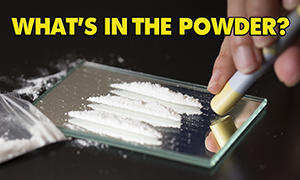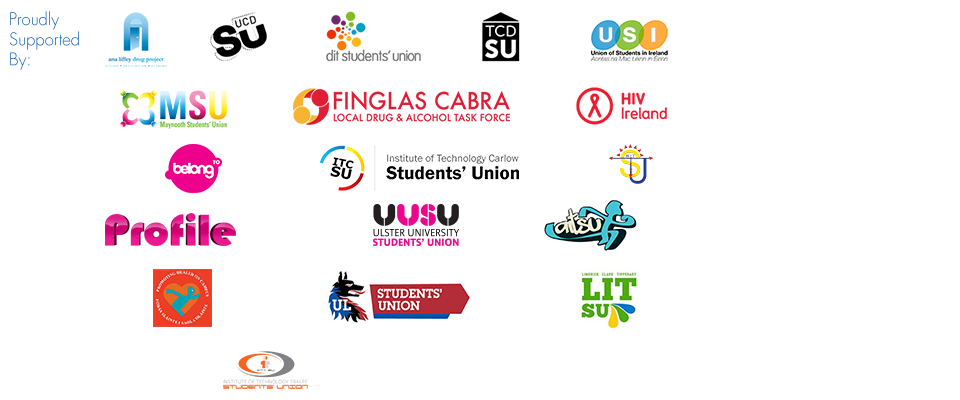What’s in the powder? Harm reduction campaign launch
 What's in the powder?
What's in the powder?
A number of different types of drugs come in white powder form. When buying illicit white powders you can never be fully sure of the contents. A range of new psychoactive substances have been found in drugs sold as cocaine, amphetamine and MDMA.
The 'What’s in the Powder?’ campaign is a collaboration between three Dublin Universities, DIT, TCD, and UCD and drugs.ie and the Ana Liffey Drug Project.
Resources created include posters and fact sheets that have been distributed on campus and promoted on social media and on the drugs.ie.
Generally, white powders are uppers (stimulant), downers (sedative) or trippy (hallucinogen).
Some examples of substances that come in white powder are:
Stimulants
- cocaine
- amphetamine
- MDMA
- mephedrone
Sedatives
- ketamine
- GHB
- PCP
Hallucinogens
- 2C-B
- N-Bomb
- Alpha-Methyltryptamine
Harm reduction information
The campaign features harm reduction information, including the following:
It is always safest not to take unknown or illicit drugs at all
If you do decide to take powders:
- it is less risky to start with a small test dose to see what effect the drug has on you. However, you cannot remove the risk entirely; small doses can also be dangerous.
- not all powders are suitable for snorting. Plan how you will take your powder in advance.
- wait 2 hours. Some drugs take longer to take effect than others.
- use your own tooter. Sniffing off unclean surfaces such as toilet seats/phones and sharing your tooter increases the risk of getting infections including blood-borne viruses.
- rinse out your nose with water afterward. Some powders clump in the nose and drip down the throat. Ketamine, in particular, can cause harm to your stomach.
- rehydrate with water or isotonic drinks regularly, but don't go over a pint per hour. If dancing, take regular breaks.
- avoid mixing with other drugs including alcohol and prescription medication. Mixing drugs can be unpredictable and may place greater strain on your heart or other internal organs.
- use in a safe environment. The use of psychoactive substances in clubs or at festivals can be frightening if you begin tripping or fall into a K-Hole
- seek help if needed and be honest with emergency services about what you think you've taken.
Seek help if needed and be honest with emergency services about what you think you've taken.
Ecstasy harm reduction information
Following the launch of the What's in the Pill? campaign on 1 April 2016 we are making the campaign poster and fact sheet available to all institutes of education and relevant organisations. Organisations just need to provide us with a copy of their logo and we will provide them with a customised factsheet and poster free of charge.
Partners section: download fact sheets and posters
- Dublin Institute of Technology Poster ¦ Fact sheet
- Trinity College Dublin Poster ¦ Fact sheet
- University College Dublin Poster ¦ Fact sheet
- Maynooth College Poster ¦ Fact sheet
- Student Union of Ireland Poster ¦ Fact sheet
- Finglas Cabra Local Drug & Alcohol Task Force Poster ¦ Fact sheet
- HIV Ireland Poster ¦ Fact sheet
- Belong To Poster ¦ Fact sheet
- Institute of Technology Carlow Poster ¦ Fact sheet
- USI Poster ¦ USI Fact sheet
- Waterford Institute of Technology Poster ¦ Fact sheet
- Profile Poster ¦ Fact sheet
- Ulster University Poster ¦ Fact sheet
- Athlone Institute of Technology Poster ¦ Fact sheet
- Download Mary Immaculate College Poster ¦ Fact sheet
- Download Limerick Institute of Technology Poster ¦ Fact sheet
- Download University of Limerick Poster ¦ Fact sheet
- Download Institute of Technology Tralee Poster ¦ Fact sheet
- Download the Cork Drug Taskforce Factsheet
Students' Unions in no way condones the use of illegal drugs.
The campaign was launched by the Lord Mayor of Dublin, Criona Ni Dhalaigh, in The Mansion House, Dublin on April 1st 2016.














